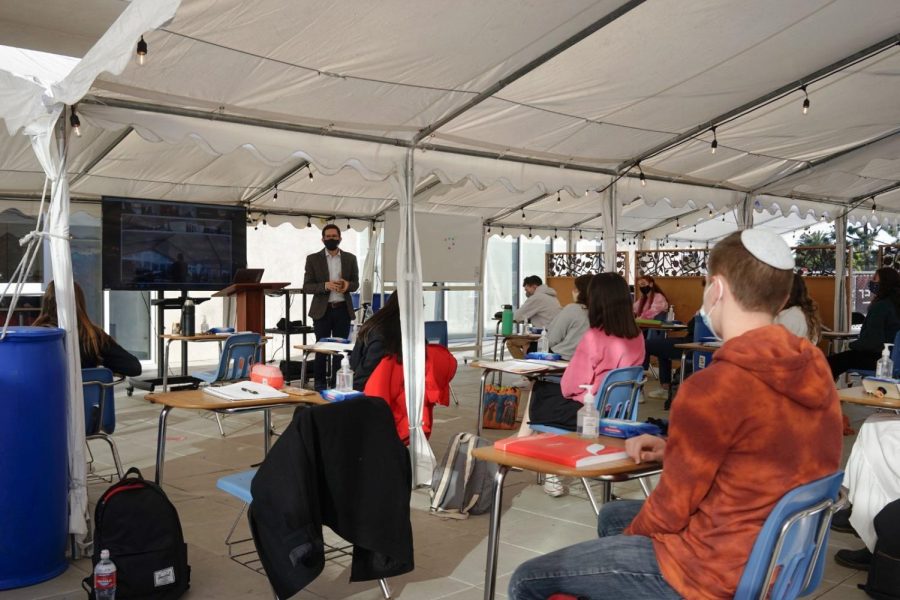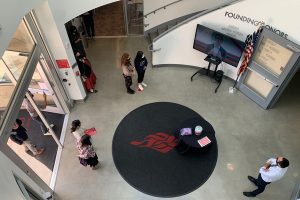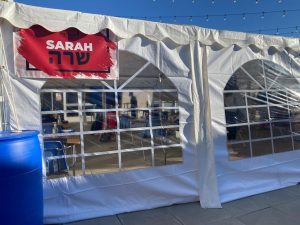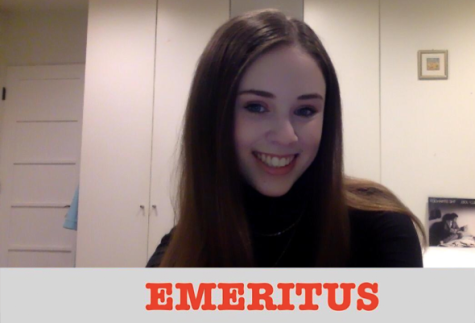Exciting, live and ‘weird,’ in-person school reopens outside in tents
BACK: Rabbi Block taught his senior Advanced Jewish Philosophy class in person for the first time Dec. 1, in the ‘Sarah’ tent outside the Beit Midrash on the third floor. Outdoor temperatures that day were in the upper 60s.
December 13, 2020
In the thousands of years that Jews have studied in chevruta, probably never before have partners been forced to learn from six feet apart while almost shouting to hear each other’s voices.
“I don’t think so,” said Rabbi David Block in an interview this week. “Can’t imagine there would be a reason for it.”
But during Rabbi Block’s first in-person class in nine months, on Dec. 1, that’s exactly what happened.
Inside the “Sarah” tent on the third floor patio, 12th-graders were considering the story of Channah from the First Book of Samuel. Working in chevruta — in pairs — everyone was still required to follow social distancing guidelines and wear masks.
Students were forced to speak up in order for their partners to hear them from six feet away.
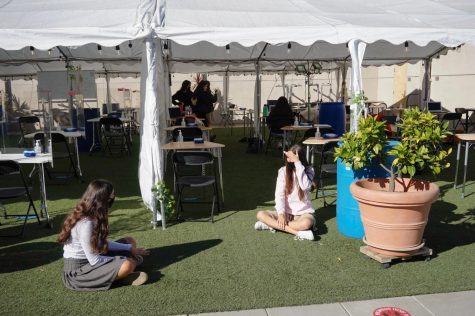
“It was a little hard because everyone was speaking at the same time,” said Gaby Bentolilla, who like Rabbi Block was enjoying her first in-person class since March. “It was different from what I was used to because we were farther apart. But we made it work.”
The in-person chevrutas were a result of Shalhevet opening school for on-campus Judaics Studies classes for the first time since the coronavirus brought everything to a halt March 12. General Studies classes are still on Zoom, but students can stay and watch them from campus.
Since last Tuesday, one grade at a time — just a quarter of the student body — has been there on any given day, about 60 students on a campus that usually holds 240. Everyone else is still on Zoom.
Seniors went first.
Classes were held outdoors in tents and the temperature was mostly in the upper 60s — chilly for Los Angeles. And though smiles were not visible through their masks, students could definitely be seen smiling with their eyes — sometimes known as “smizing” (the first syllable rhymes with “eyes”).
“Being back at school today is definitely great,” said junior Rayna Kent on the second day, Wednesday, as she relaxed on the turf between classes. “It’s nice to see all my friends and teachers and have classes in person. But it’s also really weird, and it’s been since March since we’ve been here — so I’m definitely getting used to it.”
School officials told the Boiling Point the move to in-person education was made possible by the ruling in a lawsuit filed by religious schools called Samuel A. Fryer Yavneh Academy v. Gavin Newsom. On Oct. 28, Judge John A. Kronstadt ruled that schools in California could resume in-person religious instruction.
That meant Shalhevet could expand its campus activities from after-school co-curricular “camp” and once-a-week morning davening to in-person Judaic and Hebrew classes and davening for whoever is present.
On the first day, 31 seniors out of 45 were on campus, each attending in-person 12th-grade Jewish Philosophy with either Rabbi Block, Rabbi Abraham Lieberman or Rabbi Yitzhak Etshalom, during A block from 8:35 am to 9:15 am.
Rabbi Block, who is Associate Head of School, said he hadn’t realized how much he missed teaching in person.
“There is some energy in the classroom — seeing students, having them do chevruta work, in-person,” Rabbi Block said. “Obviously social distanced, there’s something that’s intangible, that’s hard to account for.”
Room-sized white tents stretched out across the roof, each labeled with the names of Jewish forefathers and foremothers: Yitzchak, Leah, Rachel, Avraham and Sarah. On the “Sarah” tent — where Rabbi Block taught his class — there are plastic window panes, allowing people to look inside.
In-person attendance was optional. Every classroom tent had an OWL, a 360-degree video camera with microphone that picks up visuals and sound from the classroom so students on Zoom can get a fuller learning experience. That made it possible for students to follow from home.
Still, those who opted to stay home also had a different experience from previous weeks of online school.
Senior Mimi Czuker said it was more challenging to learn when everyone else was on campus.
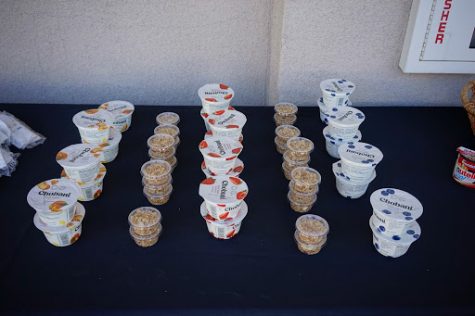
“It was a little bit of a struggle for me,” Mimi said. “It makes you feel very cut off because everyone is there but you.”
Mimi said she stayed home because she and her family wanted to be cautious. She said it must have been hard for her teacher to pay attention to people in person and on Zoom at the same time, and also the setup was such that at least on the first day, she was mostly seeing his back.
“It’s not a fun feeling to have to know that everybody is having a much better experience,” Mimi said. “It’s very different when you’re being taught in person and you’re able to create connections with each other with teachers. So being on a screen really cuts that off.”
Gaby Bentolila found it much easier to pay attention learning in person.
“My first class was very fun and more interactive than being on Zoom,” Gaby said.“I learned so much more because I wasn’t distracted by my surroundings. I didn’t have my phone with me and I wasn’t distracted by people in my house, I was very focused into the classroom.” Sophomore Talya Kukurudz said she was enjoying the strangeness of it all.
“It feels a little weird, the situation we’re in, but I think it’s a really great idea,” said Talya. “I think the fact we have masks and shields and everything, I think it’s okay, and I think it’s safe,”
Sophomore Hannah Nili, whose first day back was on Thursday, also enjoyed it.
“My experience overall was great,” said sophomore Hannah Nili. “Seeing friends, going to in person classes, and moving to different places on campus made it feel like life was normal again.”
Desks were six feet apart in all tents and there was individual hand sanitizer and wipes on each one. Students were told to wipe down their desks at the end of their classes. Some tents also had plexiglass dividers surrounding each desk.
After A block, in-person davening was held in the Avraham and Sarah tents for around 40 minutes. According to Rabbi Block, the Shalhevet Medical Task Force said students shouldn’t be allowed to use the school siddurim, so students used their phones or personal siddurim to daven.
Once davening ended, there was a breakfast spread available for students on the turf, consisting of various fruity yogurts with granola, cookies and Nutella snacks.
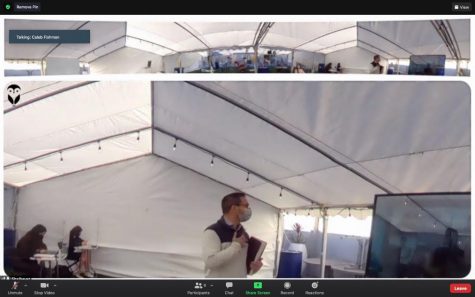
After Judaics Studies, most students opted to stay on campus for the rest of their classes, which they viewed on Zoom in two other tents that had been set up for that purpose in the parking lot. The school day ended at 2:10 pm.
For that, they were divided into four “cohorts,” which were assigned to specific tents. That was to avoid too many gathering in the same tent at once, which might interfere with social-distancing guidelines.
At first, seniors all stayed in their cohorts while attending online school. Most wore headphones, and those who didn’t segregated themselves so others wouldn’t hear their classes.
Rena Harkham said she forgot her headphones and joined her courses from a desk she moved to the corner of the roof, so those not in her class wouldn’t hear her teacher through the Zoom call.
Throughout the day, some students could be seen playing arcade-type basketball and volleyball games near the bathrooms on the roof, while others tossed a ball around on the roof and made Tiktoks. In one of the tents, students screen-mirrored a basketball game on the TV and gathered round, socially-distanced, to watch it.
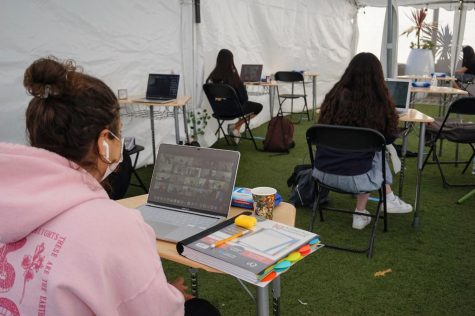
Students also walked around together in small groups, occasionally sitting down at desks or on the turf. Because they were not allowed to congregate in the building, they used the roof and parking lot areas to hang out while not in classes.
In some of the classes, seniors tuning in from the school building encountered wifi issues and complained of choppy connections. Another problem some students encountered was their computer batteries running out, and some even took out charging chords.
Unlike in past years when the paid lunch option on Friday was pizza slices from a few large boxes, during the lunch break on Dec. 1 there were individual boxes each with four slices of pizza available for everyone, free of charge.
Rabbi Block, whose first-of-the-year in-person class had 17 students present and seven on Zoom, said the administration was working on improving the in-person learning experience for students.
“There are some things here and there that we need to continue to tweak,” Rabbi Block said. “Creating more safe hangout spaces so that when students don’t have class they can either go to their cohort tent or go to another safe space.”
He said there would be a faculty check-in after the school day ended to see how they can improve, and they are planning on having a similar check-in with students.
Overall though, Rabbi Block said he thought the day went smoothly.
“Thank God we have a great outdoor space to allow this to work, and it seemed like there were great vibes,” he said. “There was really good energy in the building today.”
This story won Honorable Mention for Covid-19 Reporting in the 2021 Simon J. Rockower Awards of the American Jewish Press Association.

